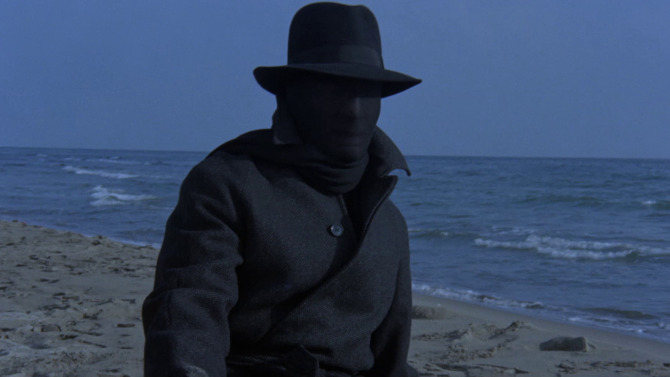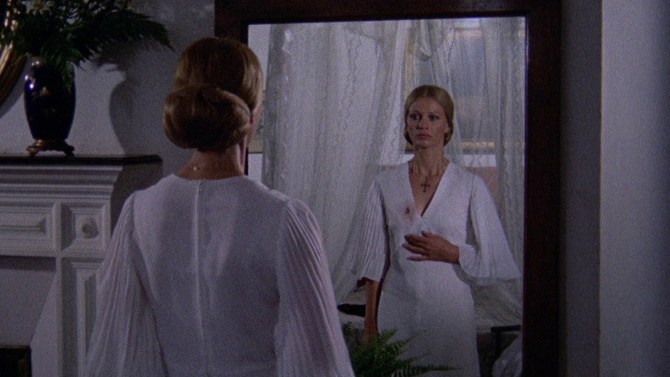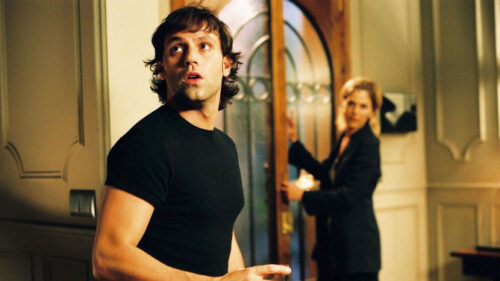
A Lawyer, a Mortician, and a Professor Walk Into a Morgue...
One of the trends of the gialli, when possible, was for the film making team to attract a formerly successful Hollywood star who had aged out of his heyday a bit... think The Pyjama Girl Case who nabbed Ray Milland, The Cat O’Nine Tails starring Karl Malden, or The Killer Is On the Phone featuring Joseph Cotten... and, with today’s example, Farley Granger leading So Sweet, So Dead (1972). Directed by Roberto Bianchi Montero, the feature, which is also known as the less subtle The Slasher ... Is the Sex Maniac! follows a small city detective, Inspector Capuana (a mustached Granger – They Live by Night; Side Street), who has recently moved to a larger locale in southern Italy.
-

Nights in White Satin
A White Dress for MarialéSeptember 5, 2023There is no denying that our childhoods play a very large part in who we become as adults. The proof is in the quasi-giallo pudding when looking at the titular character in A White Dress for Marialé (1972) – it has also been known as Spirits of Death and Tragic Exorcism. Directed by Romano Scavolini, the aforementioned Marialé (Ida Galli, aka Evelyn Stewart) had a traumatic childhood – witnessing the murder of her mother and lover by her father, only for the patriarch to turn the gun on himself after offing the secretive couple. Finding herself in an equally as toxic relationship with Paolo (Luigi Pistilli), the wealthy man hides her away in a half impressive, half dilapidated castle in the middle of nowhere with his trusty banged butler Osvaldo (Gengher Gatti) – looking like an oddball combination of an eccentric Vincent Price and inhuman Lurch.
-

The Finnish Line
SisuAugust 12, 20232023's Sisu, written and directed by Jalmari Helander, is a Finnish word that does not translate easily to the English language, perhaps best explained as a sort of persistent rational determination in the face of much adversity... the perfect explanation for this Finnish/American co-production. Thriving in a very old reverse-hybrid form of Nazisploitation combined with classic western motifs and more than a splash of modern John Wick flair, Sisu follows Aatami (Jorma Tommila), a grizzled gold miner in the decimated Finnish Lapland nearing the end of World War II. Finally striking it rich, he transports it back to civilization with his loyal dog at his side.
-

Guestwork
The Uninvited GuestOctober 15, 2022Reveling in the motifs of Edgar Allan Poe, think madness/insanity, a haunting location, the double, the uncanny, and maybe even death, Guillem Morales (Julia’s Eyes) explores the recesses of the mind in his directorial debut (he also writes the screenplay), The Uninvited Guest (2004). Who knew a four-thousand square foot home could be so claustrophobic. Félix (Andoni Gracia) finds himself alone in the weeks following the break-up from his longtime wife, Vera (Mónica López). With her having moved into a tiny three-hundred and fifty square foot apartment, it baffles Félix’s mind... unable to comprehend how anyone could downsize so drastically.
-

Giallo’s Island
Nine Guests for a CrimeSeptember 7, 2022Sometimes, a comparison just has to be made... and that is the case today with the 1977 giallo Nine Guests for a Crime, directed by Ferdinando Baldi (a film maker who was usually manning westerns or sword and sandal epics, with this being his only foray into the genre). It is also worth noting here that the movie has also been called Death Comes From the Past (in Spain), as well as having the alternate Italian title A Scream in the Night. So, their ship disappeared off the shores of this uncharted desert isle, with Greta (Rita Silva), the Skipper too (he dies too soon), the Millionaire Patriarch (Arthur Kennedy) and his much younger wife (Caroline Lawrence), the Soothsayer (Sofia Dionisio), the Professor of Truths (Dana Ghia), and Michele too (Massimo Foschi), here on Giallo’s Isle.
-

Chinese Takeout
Righting WrongsAugust 8, 2022Lawyer by day, vigilante martial artist by night. . . I know, maybe not the most expected combination, but when the courts stop working, sometimes you’ve got to take matters into your own hands. This is the general premise for 1986's Righting Wrongs (it is also known as Above the Law in some circles), directed by Corey Yuen. Hsia Ling-Cheng (Biao Yuen) is a by the books prosecutor who is about to have a rough couple of weeks. First, he is on hand to see his beloved mentor and former law school professor gunned down in New Zealand by relentless thugs attempting to keep a certain lawlessness on the streets (quite the opening scene); then, the key witness in his case, along with seven other family members, are assassinated and incinerated by a group of thugs who believe they are above the law.
-

Dubble Trouble
Sherlock Holmes and the Deadly NecklaceJuly 13, 2022It is hard to believe that the great Christopher Lee, who put his stamp on nearly all things British cinema over his seventy-one year career (featuring a whopping 286 screen credits), only donned the tweed suit, frock-coat, and deerstalker hat once (all whilst smoking a pipe) for the silver screen (though he did also play the titular Sherlock Holmes in two television movies). Released in 1962 under the title Sherlock Holmes and the Deadly Necklace, just to make it all a little more confounding, this film was a West German, French, and Italian co-production shot mostly in Berlin (though some location shooting was done in Ireland and England). . . how in the world was Lee never cast in a British made production? The other head scratcher here, and arguably the biggest flaw of the movie, is that the production team failed to use Christopher Lee’s voice in either the German or English tracks (instead dubbed by someone with a voice that pales in comparison), especially strange when you realize that the actor spoke flawless German as well. It is said that Lee was not pleased upon finding out that he had been dubbed. The only other issue is that Lee wore a fake nose for the character – and it stands out a bit too much.
